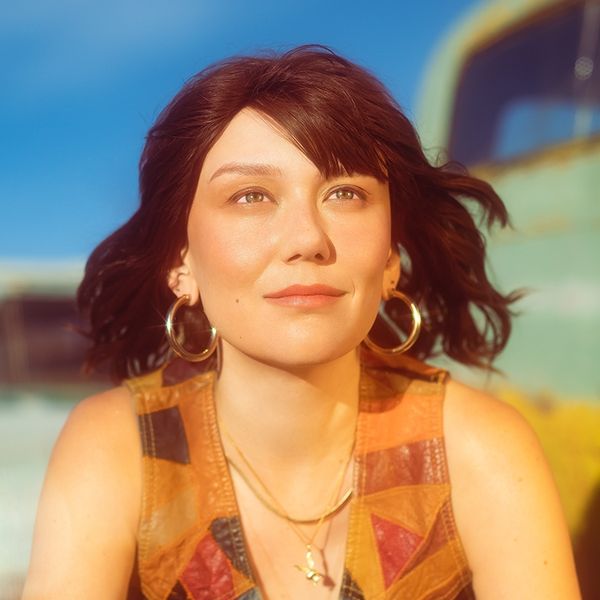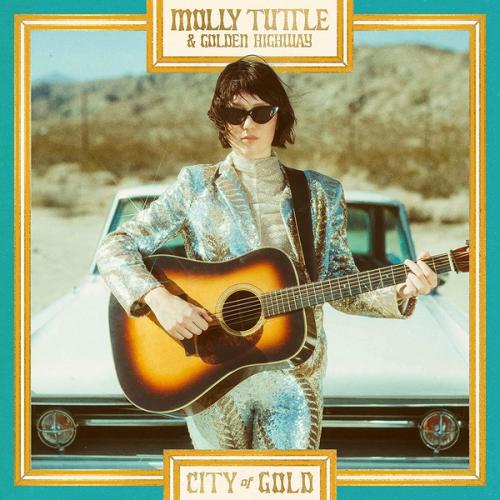




Link copied

On the cover of her latest album, City of Gold, Molly Tuttle has the look of a modern-day Ziggy Stardust, donning a jet-black wig, dark shades, silver suit and a guitar as she stands in front of her hot rod in the California desert.
It’s a bold statement, but one that Tuttle makes good on (and then some) through 13 tracks of Bowie-esque bluegrass that push the boundaries of the genre while also holding its tradition in the highest regard.
A driving force behind City of Gold’s elevated sound comes courtesy of Golden Highway, Tuttle’s touring band of virtuosos who mark their first time with her in the studio on this latest batch of songs. Comprised of Kyle Tuttle (banjo - and no relation), Bronwyn Keith-Hynes (fiddle), Shelby Means (bass) and Dominick Leslie (mandolin), the collective’s energetic and polished picking rivals everyone from fellow young guns like Billy Strings’ band to living legends like Sam Bush and Jerry Douglas, the latter a producer of Tuttle’s past two records, including 2022’s Grammy winning Crooked Tree.
Calling in from California’s San Francisco Bay area during a brief break amid her album release tour, Tuttle spoke with Holler about Alice in Wonderland, Dave Matthews, writing about what you believe in and more.
How long have you been touring with Golden Highway and what made you decide to bring them into the studio with you for City of Gold?
It’s only been about a year and a half. We did our first tour in January of 2022. I had assembled the band after I made my record, Crooked Tree. We ended up doing a big west coast tour together before the album even came out. It was kind of funny because we were playing all these songs that people hadn’t heard before, but it was also good practice for us as a band. That’s when I realized that it felt really special and that I might want to do another record and feature these band members.
One thing that stands out during your live performances is just how much energy and joy you have on stage playing together. Was it difficult trying to capture that same feeling within this new record?
Yeah, it’s so hard because we play totally different on stage. We have so much energy and everyone is feeding off each other, but when you get in the studio that doesn’t always translate. It was definitely a learning process for us, but one that I feel helped us to grow as a band.
In terms of songwriting, you wrote this entire album with your partner Ketch Secor (of Old Crow Medicine Show). What was that process like?
We got a good groove going together on my last record, so it came very naturally to write this whole batch of songs. During the pandemic I was doing all these FaceTime co-writes with a bunch of different people, but when I got back out on the road those became much harder to schedule. I like writing with Ketch because we’re able to do it naturally wherever we are, whether it be on the road or hanging out at home.
One of the songs was actually started with Shelby Means and [Front Country’s] Melody Walker, before I revamped it with Ketch by rewriting some of the lyrics in the car together one day.
These thirteen diverse, sharply composed tracks further establish Molly Tuttle as a creative, well rounded and, above all, world-class talent.
‘Next Rodeo’, right? I love the message of perseverance that the song leans into.
It’s all about not giving up and getting on to the next rodeo. For me it’s like going back on the road or getting to the next show or the next album and remaining dedicated to this life of pursuing music and the adventures you find yourself in along the way.
Melody and I actually had the idea for two songs. We wrote one called ‘Take A Penny’ that was all about “take a penny, leave a dime” and had a hook about leaving the world in a better place than you found it. Then we wrote part of a song that Shelby called ‘Second Rodeo’, but neither one seemed like a perfect fit for the album. One day I was texting Melody like ‘oh man, I’m in pre-production with Jerry [Douglas] and don’t know if these songs are gonna make the cut” and she was like, ‘well, what if we combine them into one song?’ We really liked ‘Side Saddle’ that we co-wrote for the last album. Shelby sang and had a bass solo on that song, so we wanted to bring her in to help write the next one.
As I was texting with Melody about that I was in the car with Ketch reading lyrics and working to combine the two ideas into what ended up being ‘Next Rodeo’.
You mentioned Jerry Douglass, who not only produced City of Gold but Crooked Tree as well. What’s his influence been on these past two records, your musical career and upbringing as a whole?
I was fortunate to see him perform live a lot growing up. I love his playing because he’s so virtuosic, he can play a fast fiddle tune and pick the most amazing solo you’ve ever heard, but he also knows how to lay out an accompaniment of vocalists and make a song shine. There were times in the studio where we’d be playing a song and thought it sounded pretty good and then Jerry would be like, “Ok, I’m gonna come in and play on this take”, and all of a sudden it had that extra magic that he brings to everything.
Another person I wanted to ask about was Dave Matthews, who joins you on ‘Yosemite’. How’d you first meet and eventually recruit him to be a part of this project?
I first met him during his Riviera Maya Festival in February 2022 when Shelby, Bronwyn and I opened up for him and Tim Reynolds on the beach in Mexico. We got to meet him, he watched our set and we stayed in touch. He was one of the nicest people I’ve ever met.
When I was looking for a duet partner on ‘Yosemite’ my absolute dream was him, but I didn’t think he’d do it because he’s Dave Matthews. I ended up messaging him just to see what he said, and to my surprise he responded right away saying yes, he’d love to, and I couldn’t believe it.
Hearing his voice on the song was so surreal. He knocked it out of the park, and I’d never heard him sing a bluegrass song before. I knew it would be great, but never imagined it’d turn out like it did. It blew me away.
That story is a great example of putting yourself out there and always shooting your shot, because the worst that can happen is getting told ‘no’. The song itself is a very visual one, painting landscapes of Yosemite National Park. With that in mind, how does nature and the outdoors inform your music and creative process?
I visited Yosemite all the time as a kid. It’s always been this awe-inspiring place to me. I love weaving in those places I went when I was a kid. The songs I started learning from Bill Monroe and The Stanley Brothers were fun, but they didn’t really reflect my life or where I grew up, even though there’s a rich history in California and all these fascinating places to see. For that song specifically, I thought it was an interesting juxtaposition – taking the most beautiful place in Yosemite and turning it into this nightmarish road trip.
Another song with a similar dynamic seems to be ‘Alice in the Bluegrass’, only instead of Yosemite it’s a backwoods Kentucky meets an Alice in Wonderland-like adventure. What led you to bringing those two worlds together?
I’ve always loved Alice in Wonderland. As a kid it was one of my favorite books. In seventh grade we put it on as a play as I was the Queen of Hearts, and I loved being in that role. Then during the pandemic I learned Jefferson Airplane’s ‘White Rabbit’ for a Bay Area-themed livestream I did, which led to Ketch and I talking about writing a bluegrass version of it. With that in mind, we started imagining what Alice in Wonderland would be like if it was set in Kentucky. We wove in lines from other old-time songs and tried to rewrite the story with all these references to a backwoods Wonderland.
I thought it would be cool to bring ‘White Rabbit’ back as a cover in my band, so around Halloween we all dressed up like Alice in Wonderland and started playing the song. We also recorded it last fall as an Amazon Original track, so we’ve been hinting at this one for a while.
A couple other songs I wanted to touch on with you were ‘Down Home Dispensary’ and ‘Goodbye Mary’, which collectively touch on everything from marijuana prohibition to abusive relationships and abortion rights. What are your thoughts on using your music to bring about awareness and inspire change regarding social issues?
I love how songs can bring people into an issue more gently than hearing someone comment about it on the internet or getting into a fight about something. I feel like music crosses all boundaries and can reach people, it’s important to share the things I believe in through song. I’m so inspired by women in bluegrass like Hazel Dickens, who really stood up for what she believed in in her songs about women’s and workers’ rights, it’s like I’m carrying on in her footsteps in a way. She was one of my first heroes when I was 12 or 13 years old. I just fell in love with her songwriting and voice.
With those two songs, one is definitely more light-hearted than the other. ‘Down Home Dispensary’ is poking fun at Tennessee for its lack of action on the legalization of marijuana, whereas ‘Goodbye Mary’ is about trying to escape an abusive relationship and winding up pregnant. It comes from a story my mother told me as a kid about one of my grandmother’s friends. Together they were trying to have her fall down the stairs and try other things in the hopes she’d miscarry - it is really sad that anyone would have to do that. The song is all about how the woman ends up in prison while the man is just free to go on living his life, and the double standards of that.
With you just mentioning Hazel Dickens, you got me thinking about Sinéad O'Connor and her unexpected death on July 26. What role, if any, has her music had on you as an artist?
I grew up listening to Sinéad O'Connor. I remember learning ‘Nothing Compares 2 U’ when I was a teenager and trying to sing like her. My mom’s side of the family is all Irish-American, so she’s like a hero to us. Also because I grew up with no hair, I loved her because she shaved her head. I thought it was bad ass how she was just out there rocking it.
You’ve got a very eclectic array of influences, Sinéad among them, but with your last two records you’ve really embraced and taken control of your bluegrass narrative. Can you tell me about that journey and the place you find yourself at currently?
My career and albums have been a little all over the place. I was experimenting on my first couple, then I had my first one followed by a cover album. Eventually I’d written all these bluegrass songs and had been wanting to make my own mark with a bluegrass album. At first I was worried about being pigeon-holed as a bluegrass artist, but I feel like - coming out of the crazy year that was 2020 - nothing really matters anymore, I’m just gonna do what I want. That helped me to break free from what I was afraid of and be true to where the inspiration was leading me.
Molly Tuttle & Golden Highway’s 2023 album City of Gold is out now via Nonesuch Records. For more on Molly Tuttle, see below:





